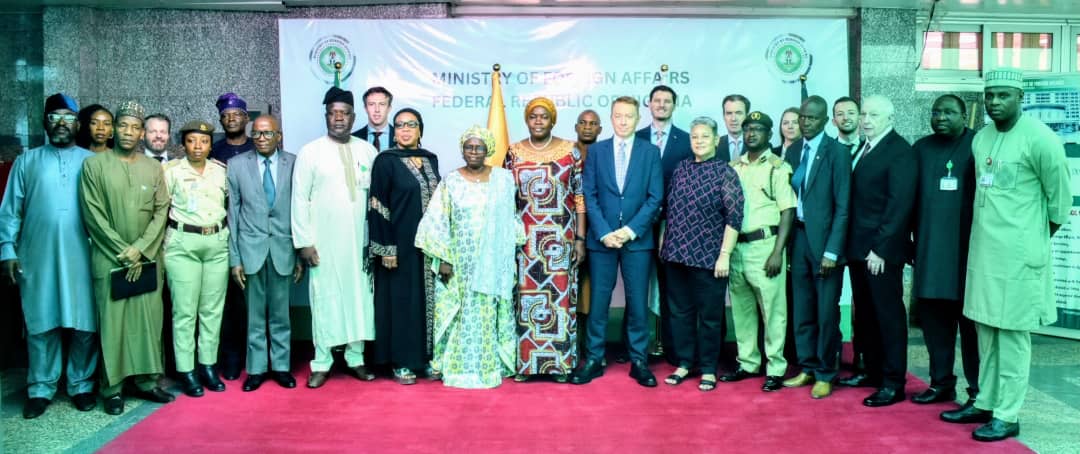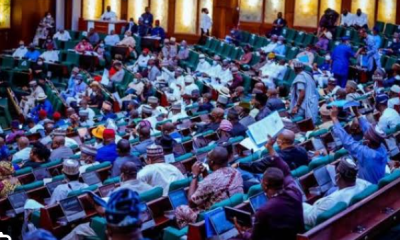News
AES Countries to Face Major Repercussions After Exit From ECOWAS – Tuggar

By Gloria Ikibah
Nigeria’s Minister of Foreign Affairs, Ambassador Yusuf Maitama Tuggar, has warned that the withdrawal of Burkina Faso, Mali, and Niger from the Economic Community of West African States (ECOWAS) will have significant consequences for regional security, economic stability, and integration efforts.
The Minister in an interview, described the exit as a complex issue requiring careful diplomatic engagement to address the underlying concerns.
He emphasised that the sanctions imposed on the three countries were a collective decision made by ECOWAS heads of state and government.
Tuggar also highlighted President Bola Tinubu’s ongoing diplomatic efforts to resolve tensions and restore cooperation with the departing nations.
He said: “Several delegations have been sent to these countries, and the presidents of Togo and Sierra Leone have been appointed as mediators to facilitate dialogue.
“Additionally, ECOWAS has lifted sanctions on these countries, paving the way for potential reconciliation”.
Tuggar also stressed that the exit poses serious security risks, especially as the region continues to battle terrorism and ongoing humanitarian crises.
“ECOWAS has established a 1650-man strong brigade to combat terrorism and offered financial assistance to support the affected countries in their fight against terrorism.
“The economic implications are also substantial, as these countries will no longer be part of the regional economic community, potentially limiting their access to markets and hindering economic growth.
“The withdrawal may also disrupt regional integration efforts, including the African Continental Free Trade Area (AfCFTA).
“The African Union and other international organizations have expressed concerns about the potential impact on regional integration efforts and the stability of the continent”, he asserted.
The Minister reiterated the need for continued collaboration and cooperation to mitigate the challenges arising from this development.
“The regional bloc has also offered support to the affected countries to address their security concerns.
“We recognize the challenges faced by these countries, and we are committed to providing assistance to help them address their security concerns,” Amb. Tuggar stated.
According to him, the exit of these countries from ECOWAS has also raised concerns about the potential impact on regional health organizations; but he said that the door remains open for these countries to rejoin the regional bloc.
“The West African Health Organization (WAHO) is based in Burkina Faso, and its relocation could have significant implications for the region.
“We hope that they will take advantage of this opportunity to re-engage with their West African neighbors and work towards a more stable and prosperous future for all”, he added.
While reacting to uncertainty surrounding the future of the Alliance of Sahel States(AES) countries’ relationship with ECOWAS, Tuggar said with continued diplomacy, cooperation, and a commitment to the well-being of the people, it is possible to navigate these challenges and promote a more stable and prosperous West Africa.
“The region is at a critical juncture, and the decisions made in the coming months and years will have a lasting impact on the future of West Africa.
“As such, it is essential that leaders prioritize the needs and concerns of the people and work towards finding solutions that promote peace, stability, and prosperity.
“Ultimately, the future of the AES countries’ relationship with ECOWAS will depend on the ability of leaders to work together and find common ground.
“As President Tinubu emphasized, the door remains open for these countries to rejoin the regional bloc, and it is hoped that they will take advantage of this opportunity to re-engage with their West African neighbors”, the Minister noted.
News
Senate mulls terrorism charges for oil theft offenders

The Senate, yesterday, issued a stern warning that perpetrators of oil theft in the Niger Delta region may soon face terrorism charges and other stiffer penalties.
Senate President, Godswill Akpabio, disclosed this while declaring open a two-day public hearing on the “Incessant and nefarious acts of crude oil thefts in the Niger Delta and the actors held.”
The hearing organised by the Senate Ad-hoc Committee on Incessant Crude Oil Theft chaired by Ned Nwoko is aimed at addressing the persistent theft of crude oil in the Niger Delta and produce actionable solutions to the problem.
Akpabio, who was represented by his deputy, Barau Jibrin, said the 10th National Assembly would not stand idly by as the country loses billions of dollars annually to what he described as “brazen economic sabotage.”
He disclosed that the National Assembly was considering a range of strong legislative responses, including categorising major acts of oil theft as terrorism, mandatory digital metering for all oil production and exports, real-time monitoring, improved transparency in crude lifting and revenue reporting, as well as enhanced coordination among military, law enforcement, and anti-corruption agencies.
“Crude oil theft is not a victimless crime. It is directly responsible for economic instability, a weakened naira, underfunded critical sectors, and widespread poverty in oil-producing communities. It also finances illegal arms, fuels violence, and strengthens criminal networks.”
Akpabio lamented that despite past efforts, crude oil theft continues unabated due to systemic failures and gaps in enforcement and oversight. Recent reports estimate that Nigeria loses between 150,000 and 400,000 barrels of crude oil daily, costing the country billions in lost revenue.
“This public hearing must address critical questions: Who are the perpetrators? Are they militants, corrupt officials, international collaborators—or all three? Why have current security measures failed? And how are stolen shipments leaving the country undetected?” he asked.
The Senate President called on all stakeholders including regulatory agencies, oil companies, security forces and host communities, to work collaboratively to stop the looting of the country’s most valuable resource. He emphasised that oil companies must invest in surveillance technology and secure infrastructure, while host communities should act as first-line defenders rather than victims or accomplices.
“To the criminals stealing our crude oil, your time is up. To the agencies tasked with protecting our resources, the nation is watching. And to this Ad-hoc Committee, the Senate expects a robust, no-holds-barred report that will guide firm legislative and executive action.”
Akpabio commended Nwoko, who chairs the Committee convening the hearing and stressed that the recommendations must lead to actionable, measurable and time-bound solutions.”
“The survival of Nigeria’s economy depends on how we respond to this crisis,” he concluded.
Meanwhile, ahead of its planned two-day national security summit, the Senate, yesterday, set up a 20-member committee to organise the event.
The Senate President, Akpabio, who announced the committee’s formation during plenary, said it would be chaired by the Senate Leader, Opeyemi Bamidele, with Yahaya Abdullahi serving as the vice chairman.
Other members are Ireti Kingibe (FCT), Adebule Idiat (Lagos), Barinada Mpigi (Rivers), Babangida Hussaini (Jigawa), Jimoh Ibrahim (Ondo), Osita Ngwu (Enugu), Tahir Monguno (Borno), Titus Zam (Benue), Ahmed Lawan (Yobe), Abdulaziz Yar’Adua (Katsina), Gbenga Daniel (Ogun), Austin Akobundu (Abia), Shehu Buba (Bauchi), Ahmed Madori (Jigawa), Emmanuel Udende (Benue), Adams Oshiomhole (Edo), Shuaib Salisu (Ogun), Isah Jibrin (Kogi) and the Clerk of the Senate, Andrew Nwoba.
The committee is tasked with developing the summit’s framework, including setting the agenda, identifying core issues for discussion, and recommending actionable strategies to improve national security. Akpabio directed the committee to submit its report within two weeks.
The decision to convene the summit followed a resolution passed on May 6 after a motion sponsored by Jimoh Ibrahim to address escalating security challenges in the country was adopted. It is expected to address pressing issues such as terrorism, insurgency, and the alarming trend of leaking military intelligence to militant groups, an issue widely seen as compromising ongoing security operations.
This is not the first time the National Assembly would attempt to address security concerns through a summit. In May 2021, the ninth Assembly, under the then Senate President, Ahmad Lawan and House Speaker, Femi Gbajabiamila, organised a similar summit. Despite contributions from security experts, civil societies, and government agencies, insecurity has continued to plague the country.
News
Court convicts 10 Thai sailors, vessel for cocaine trafficking

Justice Daniel Osiagor of the Federal High Court in Lagos on Thursday convicted ten Thai nationals for trafficking 32.9 kilograms of cocaine into Nigeria.
The convicted individuals, all sailors, were found guilty alongside their vessel, MV Chayanee Naree, which was used to smuggle the illicit drug into the country.
The convicted Thais’ sailors are: Krilerk Tanakhan; Boonlert Hansoongnern; Jakkarin Booncharoen; Thammarong Put-tlek; Worrapat Paopinta; Marut Kantaprom; Werapat Somboonying; Urkit Amsri; Panudet Jaisuk, and Amrat Thawom.
The vessel and convicted sailors were first arraigned before the court alongside nine Nigerians, on the alleged offences in February 2022, by the National Drug Law Enforcement Agency (NDLEA).
The Nigerians are: Samuel Messiah; Ishaya Maisamari; Ilesanmi Ayo Abbey; Osabeye Stephen; Gbenga Ogunfadeke; Kayode Buletiri; Rilwan Omotosho Liasu; Saidi Sule Alani, and Jamiu Adewale Yusuf.
The vessel, the convicted sailors and the nine Nigerians were arrested on October 13, 2021, at Apapa, Lagos, on their arrival from Brazil.
They were charged before the court on charges bordering on conspiracy, unlawful transportation and unlawful importation of 32.9 kilograms of Cocaine.
Their illegal acts, according to the NDLEA, contravened sections 11 (b), 11(a) and 14 (b) of the National Drug Law Enforcement Agency Act Cap N30 Laws of the Federation of Nigeria, 2004. And punishable under the same Act.
The convicted Thais and their Nigerian alleged co-conspirators were accused of committing the acts alongside the trio of Kehinde Enoch, Ayo Joseph and one Tunde, all said to be at large.
The convicted sailors were prosecuted by the NDLEA prosecutors, who include; Mrs Theresa Asuquo, A. Adebayo and Paul Awogbuyi. While they were defended by their team of lawyers, who include Babajide Koku, Femi atoyebi and Tunde Adejuyigbe, who are Senior Advocates of Nigeria (SAN).
Upon conclusion of the NDLEA’s case, the convicted sailors opted for No-Case-Submission instead of opening their defence against the allegations against them. This was, however, contended by the prosecutors, who submitted that they had established a prima facie case against the vessel and its Crew.
In deciding the No-Case-Submission, Justice Osiagor acceded to the submissions of the prosecution and held that the prosecution had established a prima facie case against the vessel and its Crew members.
The judge therefore ordered the convicted Thais and others to open their defence against the charges against them.
Based on the court’s ruling, the convicted sailors entered a plea bargain agreement with the NDLEA.
At the resumed hearing of the matter for judgment today, and based on the plea bargain agreement, Justice Osiagor ordered the vessel to pay a fine of $4 million USD or Naira equivalent.
On the convicted sailors, the judge ordered the three Captains of the vessel, namely; Krilerk Tanakhan; Boonlert Hansoongnern; Jakkarin Booncharoen; to pay the sum of $50, 000, 00 USD. And that the other crew member to pay $30, 000, USD each. And that other convicted sailors are ordered to pay the sum of N100,000. 00, as a fine optio n.
Meanwhile, the trial of the nine Nigerians has been adjourned to June 25.
News
Court of Appeal affirms nullification of Ebonyi council polls

The Court of Appeal Enugu Division has affirmed the judgement of Justice R O Riman of the Federal High Court Abakaliki, nullifying the conduct of Local Government election in Ebonyi State.
Justice Joseph Ekanem, who read the lead judgement of the Appeal court, gave the ruling while dismissing the three appeals filed by Ebonyi State Government, Central Bank and Local Government Chairmen, challenging the ruling of the Federal High Court.
The Appeal Court ruled that the earlier judgement of Justice R O Riman then of Federal High Court Abakaliki remains valid and subsisting.
According to the Appeal court: “The judgment in FHC/AI/CS/224/2022, which the Appellants challenged on appeal, was meant to enforce compliance with the earlier judgment in FHC/AI/CS/151/2022 contrary to the argument of the appellants.”
The court ruled that the appeals were dismissed for proliferation of issues for determination by the appellants which resulted in an incompetent brief of argument.
-

 Opinion23 hours ago
Opinion23 hours agoHuman Capital Devt: The Rep Paul Nnamchi
-

 News18 hours ago
News18 hours agoAlleged cyber bullying: IGP re-arraigns VDM
-

 News19 hours ago
News19 hours agoBREAKING: PDP, NNPP Rep members abandon parties, lace boots with APC
-

 News23 hours ago
News23 hours agoNnamdi Kanu’s family wants court to ban NAN coverage of son’s trial or allow live streaming
-

 News23 hours ago
News23 hours agoSEE Current Black Market Dollar (USD) To Naira (NGN) Exchange Rate
-

 News16 hours ago
News16 hours agoBill To Make Voting Compulsory For Nigerians Passes Second Reading
-

 News23 hours ago
News23 hours agoPDP Summons Emergency Meeting As South-East Threatens Exodus
-

 News22 hours ago
News22 hours agoAlleged scam: Coalition wants EFCC to charge ex-Chairman, Bawa to court immediately


















